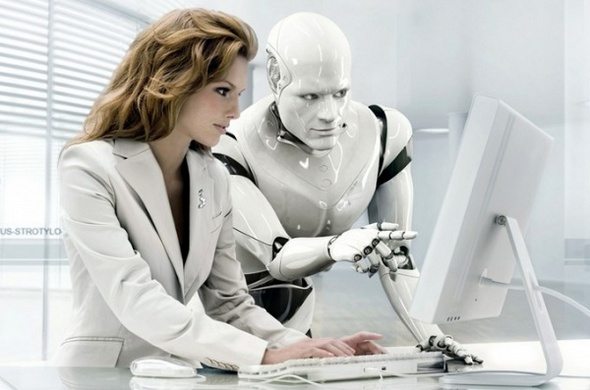
I was trying to find someone who was optimistic about the future age after robots. Most are pessimists, and I’ve referred to them a few times now. They think the world is coming to an end and that mankind will have nothing to do when the robots do everything. Can the robots do everything?
Certainly they can do most mundane tasks, like investing, which is why McKinsey and Citigroup estimate that one in three bank jobs will be fully automated within the next decade, whilst most others will be impacted by AI and machine learning. Good.
But surely robots cannot do everything a human can. For example, surely they cannot create original art …
Winner of the Robot Art competition 2017
or write engaging poetry …
You are inscribed in the lines on the ceiling
You are inscribed in the depths of the storm
or brilliant music …
So what happens when robots can do everything humans can? Do we become redundant? Or do we rise to a higher level of humanity.
I like to think the latter, but what is a higher level of humanity? If no one is needed to serve in restaurants or drive the trucks or load the container ships or make the beds, what will we all be doing?
This is something asked regularly by columnists worldwide so, taking a view from each, here is what people think people will be doing when robots do everything we do today.
The risk we are facing in the near future is mass unemployment for some categories of workers, combined with lack of skills in other categories – and the political and social implications of such imbalances. Will companies, individual governments and society at large (including educational systems and social safety nets) be able to adapt quickly enough to this new paradigm and create an environment in which all can contribute? For this to happen, all parties will need to collaborate in order to invent a systemic, social and sustainable model for a better future of work.
Whatever change is going to happen, it’s going to happen pretty fast. Like, five years from nothing different that you’d notice to a completely different world. What I want is to have people understand how urgent it is, when this thing shows up, to have made a plan.
Utopian-minded supporters imagine a world where people are free to spend their time on more worthy, humanistic pursuits. They envision a society of artists, scientists and innovators. The less idealistic question whether humans will feel fulfilled without a nine-to-five occupation. They fear a rise in crime, drug use and brain-dead entertainment.
By eliminating the need for people to work, robots would free us up to focus on what really makes us human. The scariest possibility of all is that only then do we figure out what really makes us human is work.
Everyone can enjoy a life of luxurious leisure if the machine-produced wealth is shared, or most people can end up miserably poor if the machine owners successfully lobby against wealth redistribution.
The answer that most seem to come up with is to give everyone a Universal Basic Income (UBI) which you receive whether you work or don’t work. It’s an interesting idea, and several governments have been experimenting with such an idea. Perhaps the best articulation of what is going on is summarised in The New Statesman’s review of a raft of books about the subject.
“We live in a new world, remade by many forces,” announce Philippe Van Parijs and Yannick Vanderborght, two academics from the University of Louvain, Belgium. In the midst of what they call a “disruptive technological revolution”, ecological breakdown and the decline of such collective institutions as trade unions, they insist that the key political imperative is “to rebuild confidence and hope in the future of our societies”, and “embrace radical ideas” – starting with a guaranteed income “paid upfront to rich and poor alike, regardless of the income they derive from other sources, the property they own, or the income of their relatives”.
UBI answers one of the central problems of our age: the way that the division of rewards between capital and labour seems to be growing ever-more skewed, as a few tech corporations threaten to dominate the planet, and technology polarises the job market between a small number of handsomely paid jobs at the top, and a growing mass of insecure, poorly paid roles at the bottom. If you prefer your economics to be more apocalyptic and believe that the rise of the robots will render most work extinct, the case for UBI is even stronger. But there is one big problem – politics – and some very big questions: not just how to pay for any such scheme, but how to sell the idea to millions of people used to the quaint notion that financial rewards should always be linked to hard graft.
Nonetheless, the idea is gaining political ground … Barack Obama says UBI will be at the centre of “a debate we’ll be having” over the next two decades. In June last year, Switzerland held a referendum on whether to introduce a basic income of £1,700 a month – which was roundly defeated, although the plan’s advocates (and they would, wouldn’t they?) claimed that backing from more than one in five of those who voted represented a foundation on which to build. Big figures in Silicon Valley – the latest being Mark Zuckerberg – are increasingly fond of the concept. Meanwhile, pilots have either been launched, or are being prepared, in Holland, Finland, California and Catalonia, as people try to put practical flesh on the bones of an idea that dates back at least 500 years, and whose champions have included Thomas More, Tom Paine, John Stuart Mill, Bertrand Russell, Martin Luther King, and an array of names on the political right, including Richard Nixon and Milton Friedman.
The question that then arises is that, if we all get a guaranteed income without needing to work, what will we do when we don’t need to work?
Chris M Skinner
Chris Skinner is best known as an independent commentator on the financial markets through his blog, TheFinanser.com, as author of the bestselling book Digital Bank, and Chair of the European networking forum the Financial Services Club. He has been voted one of the most influential people in banking by The Financial Brand (as well as one of the best blogs), a FinTech Titan (Next Bank), one of the Fintech Leaders you need to follow (City AM, Deluxe and Jax Finance), as well as one of the Top 40 most influential people in financial technology by the Wall Street Journal's Financial News. To learn more click here...


